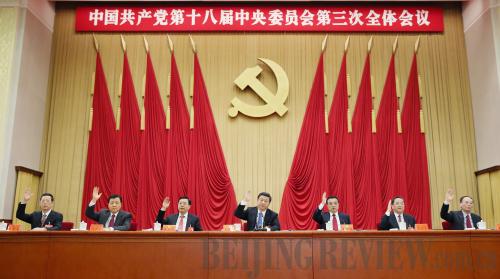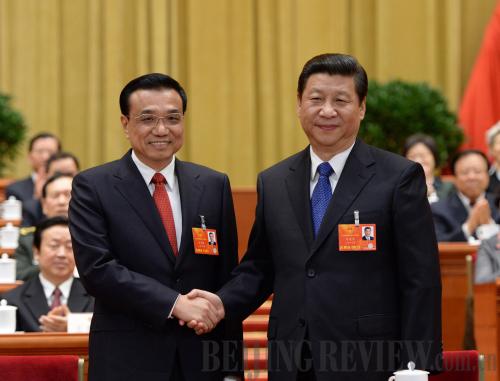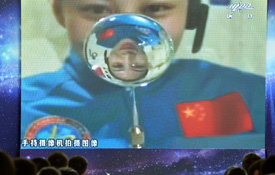|
 |
|
Top leaders of the Communist Party of China vote at the Third Plenary Session of the Party's 18th Central Committee that was held in Beijing on November 9-12 (LAN HONGGUANG) |
Reform Roadmap
The Third Plenary Session of the 18th Communist Party of China (CPC) Central Committee was held in Beijing on November 9-12, where the Decision on Major Issues Concerning Comprehensively Deepening Reforms was adopted.
According to the document, the general objective of the approved reforms is to improve and develop socialism with Chinese characteristics and push on with the modernization of the country's governing system and capabilities. Decisive results are expected to be obtained in key areas in 2020.
The decision also said that the market should be given a decisive role in allocating resources.
Other highlights of the decision included the establishment of a leading group for overall reform and a national security committee, the abolishment of the re-education-through-labor system, as well as the adjustment of birth control policies so that families may have a second child so long as one of the two parents is from a single-child family.
 |
|
Newly elected President Xi Jinping (right) shakes hands with Li Keqiang, who was endorsed as premier of the State Council, at the fifth plenary meeting of the First Session of the 12th National People's Congress in Beijing on March 15 (MA ZHANCHENG) |
Power Transfer
The largest change in state leadership since 2003 was completed at the First Session of the 12th National People's Congress, China's top legislature, on March 5-17, with Xi Jinping elected as China's new president and Li Keqiang appointed as premier of the State Council.
Lawmakers also adopted a cabinet reorganization plan, which brought down the number of ministries under the State Council down to 25 from 27.
In overhauling the cabinet, the Central Government emphasized that the most important task is to transform government functions and reduce administrative intervention in the market and on social issues.
The National Committee of the 12th Chinese People's Political Consultative Conference, the country's top political advisory body, also elected new leadership at its first session on March 3-12.
 |
 |
|
China's first moon rover, Yutu, meaning jade rabbit, drives out onto the lunar surface on December 15, hours after the Chang'e-3 probe soft-landed on the moon (LI XIN) |
Female Chinese astronaut Wang Yaping, one of the three crew members of Shenzhou-10 spacecraft, uses water to demonstrate the effects of zero-gravity to students on Earth, while aboard China's space module Tiangong-1, on June 20 (LI XIN) |
Space Exploration Milestones
China launched its fifth manned space mission on June 11 on the Shenzhou-10 spacecraft. Three astronauts boarded the craft and embarked on a 15-day space flight, which marked another step toward the country's goal of building a permanent manned space station by 2020. The mission also saw Shenzhou-10 successfully dock with the orbiting space lab Tiangong-1 twice, once through automatic operation and the other manually.
China also achieved another milestone with the successful soft landing of its lunar probe Chang'e-3 on moon surface on December 14, becoming third country to do so after the former Soviet Union and the United States.
| 